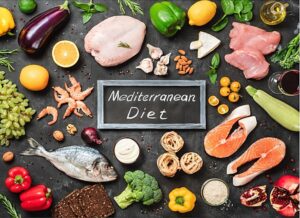The Mediterranean diet has become increasingly popular in recent years due to its many health benefits, as well as its rich culinary heritage. Originating from the countries bordering the Mediterranean Sea, this eating pattern emphasizes fresh fruits, vegetables, whole grains, lean proteins, and healthy fats. In this comprehensive guide, we will delve into what the Mediterranean diet entails, its benefits, who can benefit from it, and provide a beginner-friendly meal plan to get you started on your Mediterranean journey.

What is Mediterranean Diet?
The Mediterranean diet is a traditional eating pattern inspired by the dietary habits of countries like Greece, Italy, Spain, and southern France. It is characterized by a high consumption of fruits, vegetables, legumes, nuts, seeds, whole grains, olive oil, and fish, with moderate intake of poultry, eggs, dairy, and red wine. This diet is renowned for its heart-healthy properties and has been associated with reduced risk of cardiovascular disease, diabetes, cancer, and other chronic conditions.
Mediterranean Diet Benefits
The Mediterranean diet offers a wide array of health benefits, making it one of the most well-researched and recommended dietary patterns for overall well-being. Here are seven key benefits of the Mediterranean diet:
1. Heart Health:
The Mediterranean diet is renowned for its ability to promote heart health. By emphasizing heart-healthy fats, such as monounsaturated fats found in olive oil and omega-3 fatty acids found in fatty fish like salmon and mackerel, this eating pattern helps reduce inflammation, lower LDL (bad) cholesterol levels, and improve overall cardiovascular health. Regular consumption of olive oil, nuts, seeds, and fatty fish can significantly reduce the risk of heart disease and stroke.
2. Weight Management:
The Mediterranean diet’s emphasis on whole, nutrient-dense foods and moderate portions makes it an effective tool for weight management. High-fiber foods like fruits, vegetables, whole grains, and legumes promote satiety and help control appetite, leading to reduced calorie intake. Additionally, the diet’s low consumption of processed foods and added sugars helps prevent excess calorie consumption, making it easier to achieve and maintain a healthy weight loss.
3. Improved Cognitive Function:
Studies have shown that following a Mediterranean diet is associated with better cognitive function and a reduced risk of cognitive decline. The abundant intake of fruits, vegetables, whole grains, nuts, and olive oil provides essential nutrients and antioxidants that support brain health. Furthermore, the diet’s emphasis on fish, rich in omega-3 fatty acids, may help protect against neurodegenerative diseases such as Alzheimer’s and Parkinson’s disease.
4. Longevity:
The Mediterranean diet has been linked to increased longevity and a reduced risk of premature death. By focusing on nutrient-rich foods, antioxidants, and anti-inflammatory compounds, this eating pattern promotes overall health and well-being as individuals age. The combination of heart-healthy fats, plant-based foods, and lean proteins supports longevity by reducing the risk of chronic diseases and enhancing overall vitality.
5. Reduced Risk of Chronic Diseases:
In addition to heart disease and stroke, the Mediterranean diet has been associated with a lower risk of other chronic diseases, including type 2 diabetes, certain cancers, and metabolic syndrome. The diet’s emphasis on whole, minimally processed foods rich in vitamins, minerals, and antioxidants helps support optimal health and reduce the risk of developing these conditions.
6. Improved Gut Health:
The Mediterranean diet’s high fiber content from fruits, vegetables, whole grains, and legumes promotes a healthy gut microbiome. A diverse and balanced gut microbiota is associated with better digestion, nutrient absorption, immune function, and overall health. Consuming fermented foods like yogurt and kefir also contributes to gut health by providing beneficial probiotics.
7. Enhanced Mood and Well-being:
Following a Mediterranean diet may positively impact mood and emotional well-being. The abundance of nutrient-rich foods, particularly those high in omega-3 fatty acids, vitamins, and minerals, supports brain health and neurotransmitter function, which can influence mood regulation and mental clarity. Additionally, the social aspect of sharing meals with family and friends and enjoying leisurely dining experiences contributes to overall happiness and life satisfaction.
Who Should Take This Diet?
The Mediterranean diet is a versatile eating pattern suitable for a wide range of individuals seeking to enhance their health and well-being. Here are seven key groups of people who can benefit from adopting the Mediterranean diet:
- Individuals at Risk of Chronic Diseases: Those with a family history or risk factors for chronic diseases such as heart disease, diabetes, obesity, and metabolic syndrome can benefit from the Mediterranean diet’s heart-healthy and weight management properties.
- Individuals Managing Chronic Conditions: People already diagnosed with chronic diseases can use the Mediterranean diet to manage their conditions and improve overall health outcomes.
- Vegetarians and Vegans: The Mediterranean diet’s emphasis on plant-based foods makes it an excellent choice for vegetarians and vegans seeking a balanced and nutritious eating plan. It provides ample sources of protein from legumes, nuts, seeds, and whole grains.
- Those with Gluten Intolerance: Individuals with gluten intolerance or celiac disease can safely follow the Mediterranean diet by choosing gluten-free grains and avoiding wheat-based products.
- Individuals with Lactose Intolerance: The Mediterranean diet can accommodate lactose intolerance by emphasizing dairy alternatives such as almond milk, soy yogurt, and lactose-free cheeses.
- Active Individuals: Athletes and physically active individuals can benefit from the Mediterranean diet’s nutrient-rich foods, which provide essential nutrients for energy, muscle repair, and recovery.
- Seniors: Older adults can maintain their health and vitality by following the Mediterranean diet, as it supports cognitive function, heart health, and overall well-being in aging populations.
Mediterranean Diet Food List

When following the Mediterranean diet, it’s essential to focus on incorporating a variety of nutrient-rich foods into your meals while minimizing processed and refined foods. Here is a list of foods to include and avoid on the Mediterranean diet:
Foods to Eat:
- Fruits: Berries, citrus fruits, apples, pears, figs, grapes
- Vegetables: Tomatoes, cucumbers, spinach, kale, bell peppers, eggplant
- Whole Grains: Whole wheat bread, brown rice, quinoa, barley, bulgur
- Legumes: Lentils, chickpeas, black beans, kidney beans, peas
- Nuts and Seeds: Almonds, walnuts, pistachios, chia seeds, flaxseeds
- Olive Oil: Extra virgin olive oil for cooking and dressing
- Fish and Seafood: Salmon, sardines, mackerel, shrimp, clams, oysters
- Poultry: Chicken, turkey, duck (preferably skinless and lean cuts)
- Dairy: Greek yogurt, feta cheese, mozzarella cheese, ricotta cheese
- Herbs and Spices: Basil, oregano, rosemary, thyme, garlic, onion
Foods to Avoid:
- Processed Meats: Bacon, sausage, deli meats
- Refined Grains: White bread, white rice, pasta made from refined flour
- Sugary Foods and Beverages: Soda, candy, pastries, desserts, sugary cereals
- Trans Fats: Margarine, shortening, fried foods, commercially baked goods
- Processed and Packaged Foods: Chips, crackers, cookies, frozen meals, fast food
Try This Mediterranean Diet Meal Plan for Beginners
Embarking on a Mediterranean diet journey can be both exciting and rewarding. To help you kickstart your Mediterranean diet experience, here’s a beginner-friendly meal plan with detailed recipes:
Day 1:
Breakfast: Greek yogurt
- Recipe: Start your day with a nutritious and satisfying Greek yogurt bowl. Top Greek yogurt with a mix of fresh berries, crunchy almonds, and a drizzle of honey for sweetness.
Lunch: Whole grain salad
- Recipe: Enjoy a refreshing whole grain salad loaded with cherry tomatoes, crisp cucumber slices, briny olives, creamy feta cheese, and a zesty lemon-herb dressing.
Dinner: Grilled salmon with roasted vegetables
- Recipe: For dinner, indulge in a succulent grilled salmon fillet paired with a medley of roasted vegetables such as zucchini, bell peppers, and onions. Serve alongside fluffy quinoa pilaf for a complete and nourishing meal.
Day 2:
Breakfast: Whole wheat toast with mashed avocado
- Recipe: Spread mashed avocado on whole wheat toast and top with juicy sliced tomatoes, crumbled feta cheese, and a drizzle of balsamic vinegar for a flavorful morning meal.
Lunch: Chickpea and vegetable
- Recipe: Warm up with a hearty chickpea and vegetable stew featuring spinach, carrots, celery, onions, and garlic. Seasoned with aromatic cumin and paprika, this stew is both comforting and nutritious.
Dinner: Mediterranean-style grilled chicken
- Recipe: Enjoy Mediterranean-style grilled chicken marinated in olive oil, garlic, and herbs. Serve with a side of steamed broccoli and whole wheat couscous for a well-rounded and satisfying dinner.
Day 3:
Breakfast: Spinach and feta omelette
- Recipe: Fuel up with a protein-packed spinach and feta omelette served with whole grain toast and a side of fresh fruit salad bursting with seasonal fruits.
Lunch: Quinoa tabbouleh salad
- Recipe: Dive into a vibrant quinoa tabbouleh salad featuring cucumber, parsley, mint, tomatoes, and a zesty lemon dressing. Pair with grilled halloumi cheese for added protein and flavor.
Dinner: Baked eggplant
- Recipe: Indulge in a delicious baked eggplant stuffed with a flavorful mixture of tomatoes, onions, garlic, herbs, and pine nuts. Finish with a sprinkle of grated Parmesan cheese for a satisfying and savory meal.

The Mediterranean diet is more than just a way of eating; it’s a lifestyle centered around fresh, wholesome foods, social connections, and enjoying meals with loved ones. By following the Mediterranean diet, you can reap numerous health benefits, including improved heart health, weight management, cognitive function, and longevity. Whether you’re a beginner or a seasoned pro, incorporating the principles of the Mediterranean diet into your daily routine can lead to a happier, healthier life.
FAQs About Mediterranean Diet
-
Can I drink alcohol on the Mediterranean diet?
- Moderate alcohol consumption, particularly red wine, is often included as part of the Mediterranean diet. However, it’s essential to consume alcohol in moderation and to choose dry wines with no added sugars.
-
Is the Mediterranean Diet Good for Vegetarians and Vegans?
- Yes, the Mediterranean diet can be easily adapted to accommodate vegetarian and vegan lifestyles by emphasizing plant-based foods such as fruits, vegetables, legumes, nuts, seeds, and whole grains.
-
Are there any specific health conditions that the Mediterranean diet can help manage?
- The Mediterranean diet has been associated with the prevention and management of various health conditions, including heart disease, diabetes, obesity, cancer, and neurodegenerative diseases such as Alzheimer’s and Parkinson’s disease. However, it’s essential to consult with a healthcare professional before making any significant dietary changes, especially if you have pre-existing health conditions or concerns.

